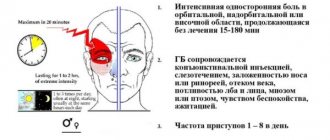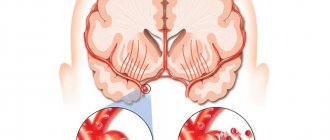About pain during the menstrual cycle
Every woman at least once in her life has encountered unpleasant and painful sensations during menstruation. For some, they occur occasionally with colds and weakened immunity, while others suffer from pain all their lives. Gynecologists of the Federal Scientific and Clinical Center FMBA say: “Pain during menstruation is not normal!”
In modern medicine, painful menstrual syndrome is regarded as a disease called “algodysmenorrhea” or “dysmenorrhea”. The first name is considered to be more accurate, but due to its length, the second name is more often used - dysmenorrhea.
There are two types of disease:
- primary (functional) dysmenorrhea – observed in adolescence and in women aged 20-25 years. Repeats cyclically, pain occurs 12 hours before menstruation or on the first day of the menstrual cycle, lasts from 2 to 42 hours. It has an aching, cramping or bursting character, radiating into the intestines or bladder. The disease is not associated with pathological changes in the genital organs;
- secondary (organic) dysmenorrhea – occurs against the background of pathological processes of the pelvic organs due to urogenital diseases and inflammatory processes. Characteristic of women after 25-30 years. It is characterized by heavy bleeding with clots and severe pain in the lower back. Pain appears and intensifies 1-2 days before the start of the menstrual cycle.
Headache in a pregnant woman
The causes of headaches in women during pregnancy and lactation may be different. In some cases they are associated with changes in hormonal levels, in others – with exacerbation of osteochondrosis of the cervical spine. Only a specialist can understand the true causes of the pathological condition. The complexity of this situation lies in the fact that during such a period the choice of medications against headaches is very limited. Therefore, only a doctor can prescribe the drug.
Up to contents
Causes of pain during menstruation
Depending on the type of dysmenorrhea, the causes of pain differ.
For functional dysmenorrhea causes:
- physiological – disruption of hormone synthesis. There is an increased production of prostaglandins - lipid substances that are responsible for contraction of the uterus during menstruation. An excessive amount leads to strong uterine contractions, which provokes pain. Increased production of adrenaline, norepinephrine, dopamine, and serotonin also leads to discomfort;
- psychological – low pain threshold, fear of pain, neurological disorders and psycho-emotional abnormalities that enhance and aggravate the perception of pain;
- vascular disorders;
- lack of magnesium in the blood.
Secondary dysmenorrhea is observed in patients with pathologies of the reproductive organs and can be caused by:
- abnormal location of the uterus, its underdevelopment and malformations;
- abnormal development of the genital organs, complicating the outflow of menstrual blood;
- endometriosis (proliferation of the inner layer of the uterine wall to other organs);
- inflammatory processes in the organs of the reproductive system;
- varicose veins of the pelvic veins;
- adhesions in the pelvis and fallopian tubes caused by inflammation of the tubes, ovaries or previous operations;
- uterine fibroids, ovarian cysts;
- sexually transmitted infections;
- installation of an intrauterine device;
- injury (consequence of surgery, frequent medical abortions);
- psychological and physical fatigue (frequent stress, violation of rest and work schedules).
Why does the temperature rise
During the menstrual period, the body experiences stress, so a slight increase in temperature is a normal reaction.
Significant hyperthermia is caused by the penetration of infection into the slightly open uterus. Microbes get inside if a woman suffers from colpitis or violates hygiene by deciding to take a bath in the bathroom or have sex on her menstrual days.
Sometimes the cause of an increase in temperature is an exacerbation of chronic “sores”. During menstruation, diarrhea caused by intestinal inflammation is common.
Symptoms
Unpleasant sensations during or a few days before menstruation can be of varying degrees and intensity. If the ailment is not pronounced and is short-term, and the pain is not significant and does not affect the usual way of life, there is no need to worry. Slight discomfort in the lower abdomen in the first days of the menstrual cycle is considered normal for the body.
However, severe pain symptoms and accompanying ailments may indicate pathology in the body:
- pain syndrome: severe pain in the lower abdomen of various types (pulling, stabbing, cramping). It can radiate to the appendage area, lower back, intestines, bladder, inner thighs;
- psycho-emotional disorder: sleep disturbance, nervousness and irritability, anxiety, depression, excessive sensitivity, mood swings, odor intolerance, change in taste preferences;
- autonomic disorders: nausea, bloating, diarrhea or constipation, dry mouth, frequent urination, chills or fever, increased sweating;
- vegetative-vascular disorders: headache, dizziness, loss of consciousness, numbness of the extremities, facial swelling, tachycardia, bradycardia, heart pain;
- metabolic-endocrine manifestations (hormone imbalance): changes in body temperature (both decrease and increase), weakness, loss of strength, joint pain, swelling, limpness in the body (wool-like legs), itchy skin.
These symptoms may be signs of a minor pathology or indicate a serious illness. The multidisciplinary center of the Federal Scientific and Clinical Center of the Federal Medical and Biological Agency recommends that patients contact our specialists to determine the causes of the ailment and their treatment.
Depending on the severity of pain symptoms, dysmenorrhea is classified:
- first degree (mild) – moderate, short-term pain in the lower abdomen. There are no violations of other body systems. Performance is maintained;
- second degree (medium) - a pronounced nature of pain, accompanied by endocrine and autonomic disorders: weakness, nausea, vomiting, frequent urination, chills, insomnia, changes in mood, depression. Requires consultation with a doctor and prescription of medications;
- third degree (severe) - severe, unbearable pain in the abdomen and lower back are supplemented by symptoms of the second degree. Accompanied by fainting, tachycardia, pain in the heart. Painkillers do not work, and the ability to work completely disappears.
If you experience monthly pain during your period, don't tolerate it! Over time, their intensity may increase, and pathological processes may develop into serious diseases. In our clinic, you can undergo a routine gynecological examination, which will help identify the causes of the ailment, detect concomitant diseases and begin adequate treatment.
Motrin® for headaches
Motrin® is a complex action drug that helps relieve headaches for twelve hours. This product has a high safety profile and is approved for sale in pharmacies without a prescription.1 To achieve the best effect and maintain the correct dosage, before using it, you must read the instructions and consult your doctor.
Up to contents
The information in this article is for reference only and does not replace professional advice from a doctor. To make a diagnosis and prescribe treatment, consult a qualified specialist.
1 According to the instructions for medical use of the drug Motrin®.
Diagnostics
Diagnosis during menstrual pain should be comprehensive. At the initial examination, it is important to tell the doctor in detail what is bothering you. Based on complaints, symptoms, and a description of lifestyle, the gynecologist will be able to exclude acute abdominal syndrome (for example, appendicitis). After an oral interview, the doctor examines the patient and prescribes a series of tests. These include:
- gynecological smear (including flora, sexually transmitted diseases, hormonal function of the epithelium, cytology);
- clinical blood and urine analysis;
- biochemical blood test to determine the level of hormones in the blood;
- Ultrasound of the pelvic organs;
- vulvoscopy;
- colposcopy.
In our center of the Federal Scientific and Clinical Center of the Federal Medical and Biological Agency, diagnostics are carried out according to international standards. The clinical diagnostic center, which is part of the clinic, guarantees the accuracy of the results and the speed of their provision. Modern equipment in the gynecology department allows for accurate diagnosis.
Prevention of pain during menstruation
Like any other disease, dysmenorrhea needs prevention. To prevent painful sensations during menstruation, you must follow several rules:
- visit a doctor regularly (if there are no complaints, once a year);
- promptly treat gynecological diseases;
- use contraception to avoid sexually transmitted infections and unwanted conception (as a consequence – abortion);
- follow the recommendations of the gynecologist;
- Consult a doctor immediately if you experience pain during your period.
Additional recommendations include: playing sports and leading an active lifestyle, abstaining from bad habits, maintaining a vitamin and mineral complex in the body, maintaining a daily routine, a balanced diet, regular sex life with a regular partner (for adult women).
Migraine and contraception
More than anything else, the procurator hated the smell of rose oil, and everything now foreshadowed a bad day, since this smell began to haunt the procurator since dawn... Yes, there is no doubt! It’s her, her again, the invincible, terrible disease of hemicrania, which makes half your head hurt. There is no remedy for it, there is no salvation. M. Bulagkov “The Master and Margarita”
Migraine is a painful headache that can be accompanied by nausea, aggravated by the slightest sound or light, and forces us to immediately go to bed in a dark room, close our eyes and hope that the attack will soon pass. Not every headache is a migraine. If, despite the pain, you can somehow move around and perform your usual duties, most likely the pain is not migraine in nature.
Rapid test for migraine
If you answer “Yes” to any question, you may be suffering from migraines.
- Are headaches accompanied by a feeling of nausea?
- Are headaches accompanied by increased sensitivity to light and noise?
- Do you experience headaches that interfere with your ability to work and perform daily activities for one or more days?
Why do gynecologists need this headache?
Despite the fact that “the head is a dark subject and cannot be examined,” gynecologists often have to delve into the details of patients’ headaches. How does it hurt, when does it hurt, is the pain related to the menstrual cycle. We always send the most “suspicious” patients for a consultation with neurologists to clarify the diagnosis.
The diagnosis is very important when it comes to using hormonal contraception. To ensure the safe use of hormonal contraceptives, WHO reviews the Medical Eligibility Criteria for Contraceptive Methods every 5 years1. This multi-page document makes it easy to select patients for whom the use of COCs is permitted without restrictions, and for whom there is a risk of complications.
How to treat
The gynecological department of the Federal Scientific and Clinical Center of the Federal Medical and Biological Agency determines and develops an approach to the treatment of dysmenorrhea individually for each patient. Depending on the causes of the disease, treatment can be preventive in nature with the prescription of medications (painkillers, antispasmodics, sedatives), or complex.
Complex therapy includes:
- taking antibiotics and anti-inflammatory drugs;
- restoration of hormonal balance;
- correction of the intake or type of oral contraceptives (installation of the IUD before birth is undesirable);
- surgery.
During therapy, consultation with related specialists (endocrinologist, mammologist, psychologist) may be indicated.
It is important to understand that relieving pain symptoms with painkillers is not a cure. Dysmenorrhea is a pathological condition and it must be treated comprehensively under the supervision of an experienced specialist!
You can make an appointment or get advice from our specialist by calling our number or filling out a convenient form on the website.
Why do they trust us with their health?
- The Department of Gynecology has been providing high-tech medical care in the treatment of all types of gynecological diseases since 1987;
- Every year more than 2,000 patients come to us and receive professional medical care;
- For each patient, our doctors develop an individual treatment plan. In complex and critical situations, the multidisciplinary center allows you to gather a consultation with specialists in related fields and quickly determine treatment tactics;
- In daily practice, doctors use the latest international achievements and advanced treatment methods;
- The operating rooms are equipped with new high-tech equipment;
- We carry out more than 2,500 operations of varying complexity per year;
- Doctors regularly take part in international congresses and research.
•










